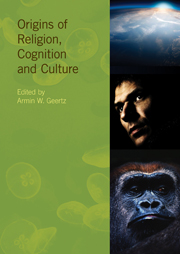Book contents
- Frontmatter
- Contents
- Contributors
- Introduction
- Part I EVOLUTIONARY SCENARIOS
- 1 Whence religion? How the brain constructs the world and what this might tell us about the origins of religion, cognition and culture
- 2 Why “costly signalling” models of religion require cognitive psychology
- 3 The prestige of the gods: evolutionary continuities in the formation of sacred objects
- 4 The evolutionary dynamics of religious systems: laying the foundations of a network model
- 5 Art as a human universal: an adaptationist view
- 6 The significance of the natural experience of a “non-natural” world to the question of the origin of religion
- 7 Religion and the emergence of human imagination
- 8 The origins of religion, cognition and culture: the bowerbird syndrome
- 9 The will to sacrifice: sharing and sociality in humans, apes and monkeys
- 10 Apetales: exploring the deep roots of religious cognition
- Part II COGNITIVE THEORIES
- Index
10 - Apetales: exploring the deep roots of religious cognition
from Part I - EVOLUTIONARY SCENARIOS
- Frontmatter
- Contents
- Contributors
- Introduction
- Part I EVOLUTIONARY SCENARIOS
- 1 Whence religion? How the brain constructs the world and what this might tell us about the origins of religion, cognition and culture
- 2 Why “costly signalling” models of religion require cognitive psychology
- 3 The prestige of the gods: evolutionary continuities in the formation of sacred objects
- 4 The evolutionary dynamics of religious systems: laying the foundations of a network model
- 5 Art as a human universal: an adaptationist view
- 6 The significance of the natural experience of a “non-natural” world to the question of the origin of religion
- 7 Religion and the emergence of human imagination
- 8 The origins of religion, cognition and culture: the bowerbird syndrome
- 9 The will to sacrifice: sharing and sociality in humans, apes and monkeys
- 10 Apetales: exploring the deep roots of religious cognition
- Part II COGNITIVE THEORIES
- Index
Summary
Everything starts somewhere, although many physicists disagree. But people have always been dimly aware of the problem with the start of things. They wonder aloud how a snowplough driver gets to work, or how the makers of dictionaries look up the spelling of the words. Yet there is the constant desire to find some point in the twisting, knotting, raveling nets of space-time on which a metaphorical finger can be put to indicate that here, here, is the point where it all began …
(Terry Pratchett 1997: 11)Prelude: understanding origins
We humans seem to have an innate drive striving to understand the world around us. This is not something restricted to scholars and the academic world but — as demonstrated by the quote from Terry Pratchett — it is something our cognition is primed to do (e.g. Guthrie 1993; Holyoak & Thagard 1995; Strauss & Quinn 1997). That we humans strive to understand is not in doubt but — as we all know — what exactly is meant by understanding is a hotly debated issue, and it seems to mean different things for different peoples in different contexts (e.g. Outhwaite 1975; Gothóni 2005; Dennett 2006: 258—64). The debate might as well go on ad infinitum, and my intention is certainly not to tackle it here. Instead, I will draw attention to the rather trivial point that depending on what we mean by, for example, understanding, religion as an instance of human behaviour might sometimes have important consequences in terms of how feasible our approach is in scientific terms.
- Type
- Chapter
- Information
- Origins of Religion, Cognition and Culture , pp. 219 - 240Publisher: Acumen PublishingPrint publication year: 2013

